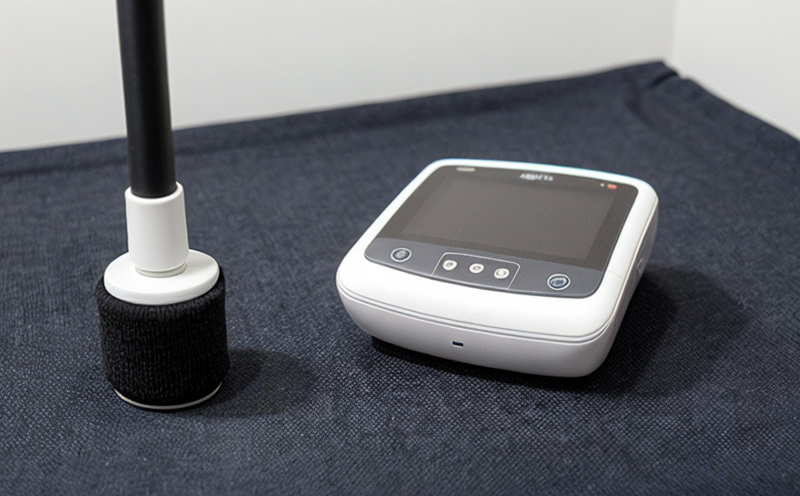AATCC 210 Durability of smart fabric finishes after washing
The AATCC Test Method 210 is a critical procedure used to evaluate the durability and performance of smart fabric finishes following multiple wash cycles. This test ensures that the functional properties of these textiles, such as antimicrobial, water repellency, or thermal regulation capabilities, remain intact post-washing.
Smart fabrics are increasingly popular in various sectors including fashion, healthcare, and sportswear due to their ability to enhance comfort, safety, and functionality. However, durability is a key concern for these textiles. AATCC 210 provides a standardized method to assess how well the smart finishes withstand repeated washing cycles without losing their effectiveness.
The test involves subjecting samples of fabric with smart finishes to a series of washings according to specified parameters (temperature, duration, and detergent type). After each cycle, the sample is evaluated for its functional properties. This process helps manufacturers understand how well their products will perform in real-world conditions over time.
For instance, if a fabric claims to have antimicrobial properties, AATCC 210 ensures that these properties are not compromised after multiple washes, which is crucial for maintaining hygiene and health benefits. Similarly, water repellency or breathability features should retain their performance post-washing as expected.
Understanding the standards and requirements for this test is essential for quality managers, compliance officers, R&D engineers, and procurement teams involved in textile production. It allows them to make informed decisions about material selection and process optimization.
- Environmental Impact: By ensuring that smart fabric finishes maintain their properties post-washing, AATCC 210 helps minimize waste by reducing the need for frequent replacement of textiles.
- Sustainability: This test supports sustainable practices by promoting longevity and reliability of functional fabrics, thereby reducing resource consumption.
- Ethical Manufacturing: Ensuring durability contributes to ethical manufacturing by enhancing product quality and customer satisfaction.
In summary, AATCC 210 is a vital tool in the textile industry for assessing the performance of smart fabric finishes. It ensures that textiles maintain their functional properties post-washing, which is essential for maintaining hygiene, comfort, and safety in various applications.
Why Choose This Test
Selecting AATCC 210 Durability testing offers several advantages to manufacturers and suppliers of smart fabrics. Firstly, it provides a standardized method that ensures consistency across different laboratories, making results comparable and reliable. Secondly, this test helps in identifying potential issues early on during the development stage, allowing for necessary adjustments before large-scale production.
For quality managers and compliance officers, choosing AATCC 210 ensures adherence to industry standards, which is crucial for maintaining a good reputation and meeting customer expectations. R&D engineers benefit from this test as it provides valuable insights into how different materials or processes affect the durability of smart finishes. Procurement teams can use these results to select suppliers who meet high-quality standards.
Moreover, compliance with AATCC 210 helps in avoiding costly recalls and rework due to product failures post-market release. It also facilitates easier market access by meeting regulatory requirements and industry benchmarks. By choosing this test, you ensure that your products are not only innovative but also reliable and sustainable.
Finally, the use of AATCC 210 fosters trust among consumers who value longevity and reliability in their textile purchases. This can lead to increased customer satisfaction and loyalty, which is beneficial for any business in the sector.
Quality and Reliability Assurance
Implementing AATCC 210 Durability testing as part of your quality control process ensures that smart fabric finishes remain effective after multiple washes. This enhances the overall quality and reliability of your products, which is essential for maintaining customer trust and satisfaction.
The test involves several key steps to ensure accurate results. Specimens are prepared according to specified dimensions and finish application. The washing process follows defined parameters including temperature, duration, and detergent type. After each cycle, the specimens are evaluated using appropriate measurement tools.
Acceptance criteria for this test vary depending on the specific smart fabric property being evaluated (e.g., antimicrobial efficacy, water repellency). These criteria ensure that only products meeting these standards pass the test. Compliance with AATCC 210 helps manufacturers demonstrate their commitment to quality and reliability, which is vital in competitive markets.
In addition to improving product performance, this test also aids in process optimization by identifying areas where improvements can be made. For example, if a particular washing temperature affects the durability of a finish, adjustments can be made based on these findings. This continuous improvement cycle contributes significantly to maintaining high standards across all products offered.
By incorporating AATCC 210 into your quality assurance program, you are taking proactive steps towards ensuring that your smart fabrics meet or exceed customer expectations in terms of durability and performance.





